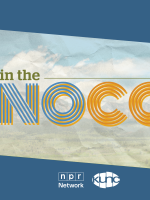In February of 1942, not long after the bombing of Pearl Harbor, the U.S. military removed thousands of Americans of Japanese descent from their homes. Most of them were full citizens who had been born and raised in the United States.
Families had just a few days to get their affairs in order before reporting to relocation centers, mostly in Western states. Roosevelt’s , including 17,000 children.
Writer and poet , who is fourth-generation Japanese American, says the impact of incarceration didn’t end with the war.
Shimoda, who lives in Colorado Springs and teaches at Colorado College, is a descendant of several family members who were incarcerated in internment camps. He says his family’s stories helped inspire his newest book, .
He spoke with Erin O’Toole about the legacy of Japanese American incarceration, and why the impacts still resonate today.
Brandon Shimoda will be part of a , this Saturday, Feb. 15 during Fort Collins Book Fest. Find the full lineup of .








